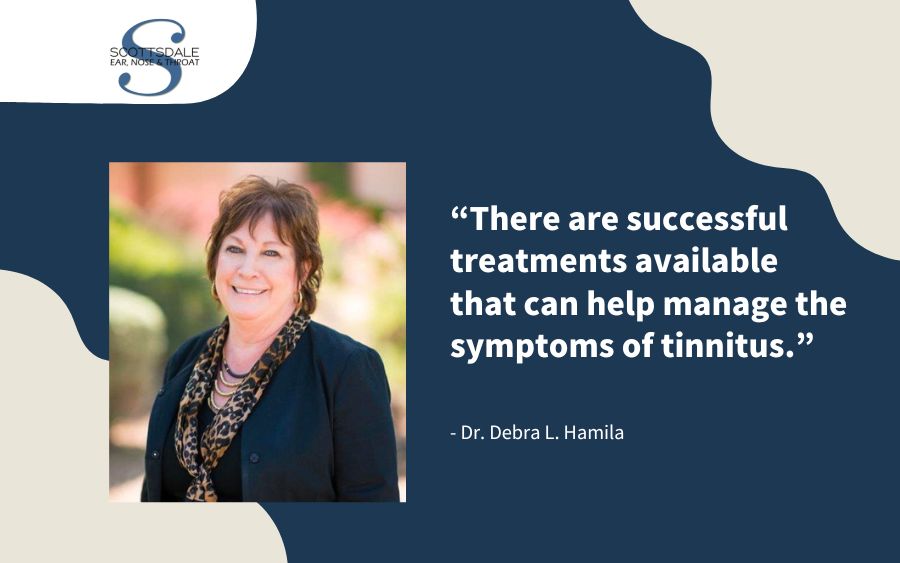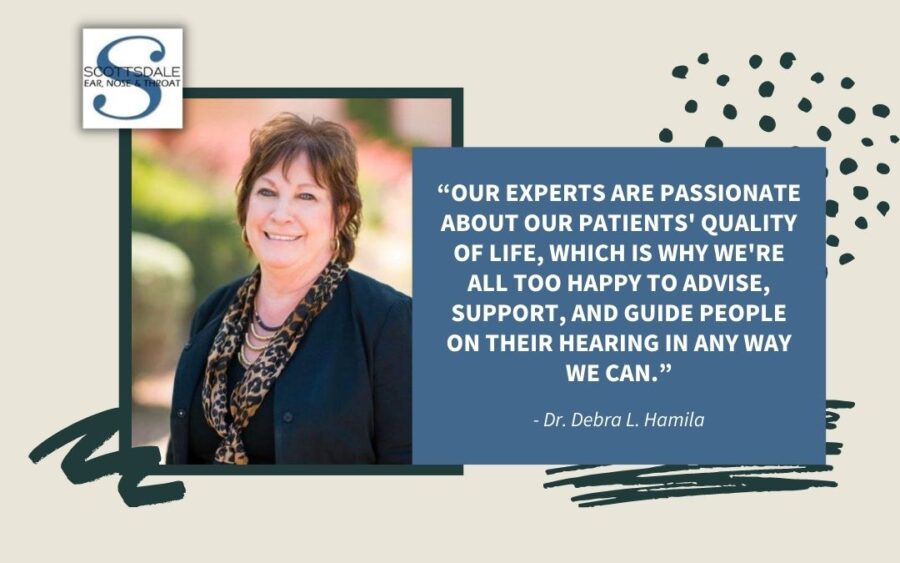Tinnitus can be a very difficult issue to cope with on a day-to-day basis, depending on the severity of the tinnitus symptoms. The short answer is yes, sometimes tinnitus goes away. However, most symptoms of tinnitus are not cured but rather successfully managed.
Millions of people are reluctant to seek help for tinnitus because it is either not affecting their lifestyle too badly, or they believe there is nothing that can be done to make it go away, or they prioritize other health needs. However, about 10M of the 21M+ tinnitus sufferers in the US do seek help and often find it.
Scottsdale Ear, Nose & Throat has a team of six ENT specialists to help you acquire a correct diagnosis and a tailored treatment plan to bring you to a place where your tinnitus is hardly noticeable.
Do You Have Tinnitus?
Tinnitus is the perception of sound when no corresponding external noise is present. While it is commonly described as a ringing noise, tinnitus can also sound like a clicking, hissing, or roaring. The sound can be consistent or intermittent.
Tinnitus can affect one or both ears, and it can vary in softness, loudness, or tone from one ear to the other. In rare cases, tinnitus occurs as an alternating rhythm of sound – often at the pace of a heartbeat.
Sometimes the sound can become so loud that it interferes with your concentration and sound perception. The sound is often worse when background music is low or when you are trying to sleep in a quiet room.
Tinnitus Causes
Tinnitus is not a condition itself – it is a symptom of an underlying condition.
There are many different causes of tinnitus, including hearing loss, earwax buildup, age-related changes to the hearing nerve, damage to the auditory nerve or the inner ear, head or neck injuries, and certain ototoxic medications.
Noise-induced hearing loss is one of the top culprits, with many people in careers in loud-noise or sudden loud-noise environments, such as the military, experiencing noise-induced hearing loss and tinnitus.
Is Tinnitus Curable – Does It Ever Go Away?
In some cases, tinnitus goes away on its own. If the underlying cause can be identified and treated, tinnitus may go away also.
According to the American Academy of Otolaryngology – Head and Neck Surgery: “If you are in the ‘new onset’ period of tinnitus (less than 6 months), you can be reassured that, for many, the natural course of tinnitus is to improve over time and most people do not go on to have persistent bothersome tinnitus.”
There are successful treatments that can help manage the symptoms if your tinnitus has not gone away. Tinnitus is viewed as chronic rather than acute if it is still present after two years.
Is Tinnitus Real or Is It in My Head?
No, tinnitus is not imagined. It is a real phenomenon that can be measured by objective means. However, the perception of tinnitus can vary greatly from person to person. Some people are barely aware of their tinnitus while others find it debilitating.
How You Can Learn to Live with Tinnitus
The most important thing is to find a way to manage your tinnitus so that it does not negatively impact your quality of life.
Different people notice different triggers for their tinnitus. Some people find that their tinnitus gets worse when they are under stress or tired. Others find that their tinnitus worsens after smoking or drinking alcohol or coffee.
If you are seeking ways to treat or manage your tinnitus on your own, the following can help:
Sound therapy – This can help to mask the noise of tinnitus and make it less noticeable. If you have hyperacusis — a high sensitivity to sound — sound enrichment has been proven to help.
Avoid loud noise – Exposure to loud noise can worsen tinnitus. Ask us about hearing protection products we recommend.
Manage stress – Stress can worsen tinnitus, so finding ways to manage stress can help. Some relaxation techniques are more helpful than others, such as listening to soothing music, doing daily progressive muscle relaxation exercises, or trying visualization exercises.
Exercise – Exercise can help improve your overall health and well-being and help your body relax better at night, which also can contribute to getting more sleep.
Get support – There are many organizations and support groups available for people with tinnitus, such as the Tinnitus Talk Support Forum. Talking to others who understand what you are going through can be very helpful.
Despite the many self-help treatments for tinnitus, a treatment plan by an ENT specialist or audiologist can be the answer you seek in finding adequate relief.
The Tinnitus Treatment Options Scottsdale ENT Provides
Fortunately, there are many successful ways an ENT doctor can treat tinnitus and manage the symptoms to where they become minor rather than major.
Because one of the main underlying causes of tinnitus is hearing loss, the first step is to get a full hearing evaluation and begin hearing treatment if you are found to have a hearing loss. In some cases, this takes care of the tinnitus completely.
A Scottsdale ENT specialist treats any other factors that might be causing the tinnitus (such as ototoxic medications and medical issues) and examines your noise environment to see if hearing protection might help.
For some patients, tinnitus lessens with hearing aids, but it is still present. Fortunately, hearing aid technology has developed to where we can now treat tinnitus and hearing loss with tinnitus relief hearing aids – these can play gentle sounds or white noise to mask the tinnitus as a feature of the hearing aid or its app features.
Tinnitus hearing aids work best in conjunction with what is termed “habituation therapy,” which applies a therapeutic approach to treating tinnitus by retraining the brain to react differently to the sound and reframing the thoughts and emotions surrounding it.
Where to Find Tinnitus Treatment in Scottsdale, AZ
Scottsdale Ear, Nose & Throat understands how debilitating tinnitus can be, sometimes even to the point where it affects every aspect of your life.
Book your tinnitus assessment and/or hearing evaluation online or call us at 480-684-1080 to schedule.
Our goal is to help you find relief from your tinnitus, and if we cannot treat it to where it goes away, we can promise that we will help it become manageable so you can start enjoying life once again.




